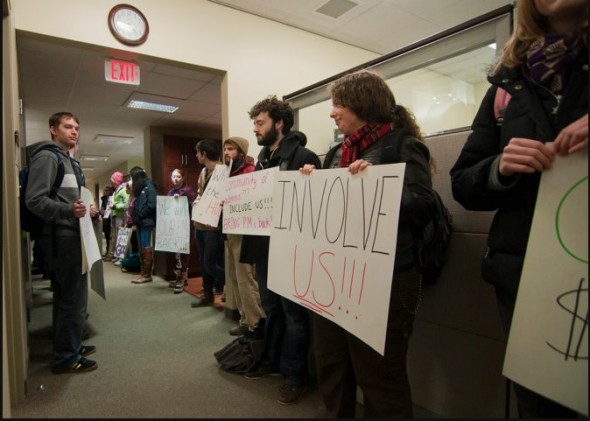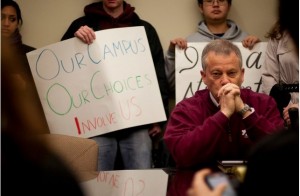Peer Mentor Update: I was in the room

By Avery Fuerst of UMass SLAP
At 8 a.m. Friday, February 24th, over 60 UMass Amherst students held a silent protest at Whitmore, the head administrative building on campus, to publically stand united against the firing of the Peer Mentors (PMs) and Apartment Living Assistants (ALAs).
This is the second time that the Involve Us campaign, spearheaded by UMass Amherst SLAP, rallied students together to protest their administration’s decision to fire these 92 student jobs without any student involvement. The first protest was held last semester within 23 hours of the PMs and ALAs firing, and peaked at over 120 protesting students, while also gathering 1,500 petitions to keep the Peer Mentors were signed last fall. They were sent to the UMass Board of Trustees, and the administrates held responsible for these student job cuts, including Vice Chancellor Jean Kim, Director of Residential Life Eddie Hull and Director of Residential Education Tara Loomis. In response, a Working Group for Student Success was created to reevaluate the cutting of PMs amongst other student success issues. The working group includes Hull and Loomis as well as four other administrators and two students.
This working group is the body that the Involve Us campaign, its coalition members and concerned students protested this past Friday. As was communicated by the administration, Friday was supposed to be the last possible chance to resurrect the highly supported Peer Mentor positions, so we felt the need to remind our administration that they could not simply cut student jobs without student involvement. We began our protest with a speech by our student government president, Yevin Roh, and the SLAP core team leader, Allison McGrail, and proceeded into Whitmore chanting until we reached the meeting room.
 Once in the offices of the chancellor, a few student speeches were made by lead student organizers such as myself and other students involved in Residential Life, like Peer Mentor Kyle Mendes and Allison McGrail. We then proceeded with a silent protest, holding signs that conveyed our demands. The Administrators of the working group asked for us to leave because they did not “feel comfortable making decisions in front of such a large body of students”. We took a vote: the majority of the students decided that we should vacate the space and leave behind delegation of four students to remain and participate in the meeting. This way there would be six students in the meeting total, and therefore an equal representation of students and administrators. The four chosen students were Mendes, McGrail, Tiff Tai, a representative of the student government, and myself as an RA and organizer. We four were led to believe that we would have full participatory status at this meeting since the vast majority of our delegation had been asked to leave.
Once in the offices of the chancellor, a few student speeches were made by lead student organizers such as myself and other students involved in Residential Life, like Peer Mentor Kyle Mendes and Allison McGrail. We then proceeded with a silent protest, holding signs that conveyed our demands. The Administrators of the working group asked for us to leave because they did not “feel comfortable making decisions in front of such a large body of students”. We took a vote: the majority of the students decided that we should vacate the space and leave behind delegation of four students to remain and participate in the meeting. This way there would be six students in the meeting total, and therefore an equal representation of students and administrators. The four chosen students were Mendes, McGrail, Tiff Tai, a representative of the student government, and myself as an RA and organizer. We four were led to believe that we would have full participatory status at this meeting since the vast majority of our delegation had been asked to leave.
We were wrong. The director of the working group, Carol Barr, interrupted every student in the delegation by saying “working group only” if we tried to speak. I and the other members of the student delegation decided to speak up anyways. Speaking for myself, I was not going to be silenced by a working group whose official mission was to serve students. The working group was trying to decide how to substantiate their attempts to alter Residential Life without asking students. When they began talking about using statistics to back their proposed changes, I spoke up again. At this point I mentioned that 1500 student had signed a petition demanding the reestablishment of the Peer Mentor position. The director of the working group reminded me again that this was a “working group meeting only” and therefore my comment was out of line. Other suggestions generated by students including Roh’s proposal and clarifications on the Peer Mentor role by Mendes also fell on deaf ears. This meeting made it clear to all students involved that the administrators were not going to voluntarily listen to us students, and that we were going to have to pressure them to include us.
We, the Involve Us campaign, will continue fighting for the restoration of the PM and ALA jobs. We also demand that students are given equal representation on all committees that make recommendations affecting student life to our administrators, and that students are given equal status to all other members on these committees.
